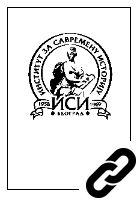2. Naučni članci
-

-
Creating a Communist Yugoslavia in the Second World War
-
The Second World War involved the conflict of three different ideologies – democracy, fascism and communism – an aspect in which it was different from the Great War. This ideological triangle led to various shifts in the positions, views, and alliances of each of the warring parties. Yugoslavia with its historical legacy could not avoid being torn by similar ideological conflicts. During the Second World War a brutal and exceptionally complex war was fought on its soil. The most important question studied in this paper concerns the foremost objective of the Communist Party of Yugoslavia (KPJ) – to carry out a violent change of the legal order and form of government of the pre-war Kingdom of Yugoslavia., Published, Šifra projekta: 177016
-

-
Za željeno roditeljstvo
-
Rad razmatra državnu politiku socijalističke Jugoslavije na polju planiranja porodice. Posebna pažnja je posvećena obrazovanju tela koja su se ovim poslom bavila, propagiranju željenog roditeljstva, kontracepciji kao i naporima da liberalizovani abortus prestane da bude (osnovna) metoda kontrole rađanja., Although the socialist governments promoted maternity believing that it cannot be completely in the private sphere of women’s life, state policy in the field of family planning never tried to regulate fertility. In the early 60-ies, family planning became social, and not just a health issue. Although there was a general consensus that the number of unwanted pregnancies (and thus the number of abortions) should be prevented through sexual education, improvement of health care services for mother and child and by providing counseling and a wider range of contraceptives application these principles in practice was slow. Together with the Conference for Social Activity of Women, the Federal Council for Family Planning worked on shaping attitudes that served as a kind of platform for the adoption of the Resolution on Family Planning (1969) which was a kind of a national program. The right of the parents to determine the number of children in the family and the interval between births was defined as „one of the fundamental human rights“, which was to be achieved by using contraception. In accordance with this view, an abortion was defined as the „last
means that would enable women to terminate an unwanted pregnancy.“ A few years later, the human right to decide freely on having children was included in the Constitution (1974)., Published, Šifra projekta: 177016, Rad je deo projekta Srpsko društvo u jugoslovenskoj državi u 20. veku: između demokratije i diktature (177016), koji finansira Ministarstvo prosvete, nauke i tehnološkog razvoja Republike Srbije.
-

-
Напори југословенских власти на сексуалном просвећивању радница привремено настањених у западној Европи 70-их и почетком 80-их година 20. века
-
Рад разматра половичне напоре власти да путем сексуалног просвећивања Југословенки привремено настањених у земљама западне Европе фаворизују жељено родитељство и смање број нежељених трудноћа и абортуса. Ове недовољно систематичне и координисане активности требало је, пре свега, да олакшају и побољшају положај мигранткиња у туђини, али и да, посредно, покушају да предупреде и утичу на специфичне социјалне проблеме у земљи проузроковане миграцијама. Рад је заснован на изворима из Архива Југославије и релевантној литератури., This paper deals with the partial efforts of the authorities to promote the desired parenting and reduce the number of unwanted pregnancies and abortions through the
sexual education of Yugoslav women temporarily residing in the countries of Western Europe. These insufficiently systematic and coordinated activities were supposed, before all, to facilitate
and improve the situation of migrant women abroad, but also, indirectly, to try to prevent and influence the specific social problems in the country caused by migration. This study
is based on the sources of the Archives of Yugoslavia and relevant literature., Published, Šifra projekta: 177016, Чланак је резултат рада на пројекту Српско друштво у југословенској држави у 20. веку: између демократије и диктатуре (N0 177016) који финансира Министарство просвете, науке и технолошког развоја Републике Србије.

